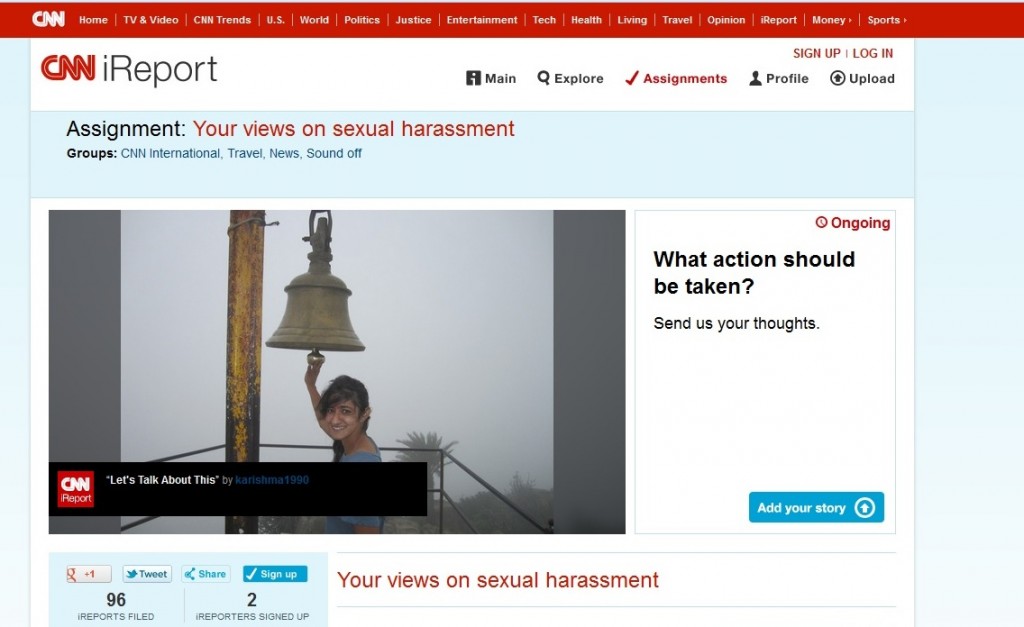By: Delia Harrington, Massachusetts, USA, SSH Correspondent

Last week, under the username Rosechasm, University of Chicago student Michaela Cross published a CNN iReport that has shaken readers and spurred reactions across the web. The piece, entitled “India, the Story You Never Wanted to Hear” details many terrifying examples of street harassment, staring, groping, and attempted or threatened rape that the author says happened to herself or fellow classmates during a semester abroad in India through their university.
CNN has since called for women all over the world to share their own stories of street harassment and perspectives on Cross’s original iReport as well as potential solutions or methods to mitigate street harassment and other gender-based violence. Many women, including Stop Street Harassment’s founder Holly Kearl, have since heeded that call, and their stories are well worth a read.
Many have misread the article as a universal condemnation of Indian men and India in general. The author expresses repeatedly that her experience in India was one of contradiction, including both those of the positive, once in a lifetime variety and those of a more traumatic nature. While it is hard not to feel lately that some observers and media outlets are holding up India as a problematic “other”, that doesn’t mean people should stop telling their stories or reporting on the stories of others.
Another common criticism is that Cross’s article ignores the treatment Indian women receive within their own country. That was not the focus of her article, and it seems reasonable that Cross would only write of her own experience and the experience of those she knew through her program, especially given iReport’s format. However, since it bears repeating, here are some stories Indian women have since posted to CNN about their own treatment, good or bad. Gender-based violence looks different for local women than it does for foreigners, but as travelers and allies in the struggle against such violence, we must remember that eventually we will leave, and many women don’t have that option.
Finally, many have highlighted the prevalence of street harassment and gender-based violence worldwide, especially within the writer’s (and my) native United states. Again, I think this is rightfully outside the scope of Cross’s article, but the very existence of this blog and others like it demonstrates that street harassment is not limited to India or the developing world. However, that doesn’t make Cross’s experience any less real or traumatic.
Cross’s experience shows how street harassment is unfortunately only one part of the spectrum of gender-based violence, which includes stalking, groping, sexual assault, and murder. For a victim of this type of violence, even the more “minor” incidents can feel (and become) incredibly dangerous. In a statement to CNN, the University of Chicago writes that all students are offered, “extensive support and advice to students before, during and after their trips abroad,” and yet Cross didn’t approach them during her program. In her own words, she thought she was prepared to handle the stress of India:
“When I went to India, nearly a year ago, I thought I was prepared. I had been to India before; I was a South Asian Studies major; I spoke some Hindi. I knew that as a white woman I would be seen as a promiscuous being and a sexual prize. I was prepared to follow the University of Chicago’s advice to women, to dress conservatively, to not smile in the streets. And I was prepared for the curiosity my red hair, fair skin and blue eyes would arouse. But I wasn’t prepared.”
Contrary to what many online commenters have accused, it appears Cross was as fully equipped as a person could be for the potential stresses of travel. Not only that, she seems to have taken all the usual precautions advised to female travelers (and females in their own countries.) If all of the University of Chicago’s years of experience sending students to India, as well as her personal knowledge from traveling to India previously weren’t enough to help keep her safe, would anything be enough? Short of not going to India, which is not an option for many Indian women and isn’t a viable option for travelers, what more could a woman do to avoid this situation? I think perhaps it’s time for the onus to prevent street harassment to come off of women, and be placed on perpetrators as well as our law enforcement and legislators.
I am impressed that Cross was able to share her story so publicly, and I love that so many women worldwide have taken to CNN’s iReport assignment to join her in sharing their lived experiences with street harassment. I’m a firm believer that speaking up and supporting those among us who speak up is one way of fighting back. Instead of devolving into an argument over where harassment is worse, I hope we remember that women in America, India, and the world over have something in common right now: we are speaking up, and we are fighting back.
Delia Harrington is a recent graduate of Northeastern University and calls Boston home. In recent years, she has found herself studying, working, and volunteering in Egypt, Cuba, France, Benin, the Dominican Republic, Turkey, Germany, and Greece. You can read more of her writing on her blog, or follow her on Facebook and Twitter, @deliamary.




